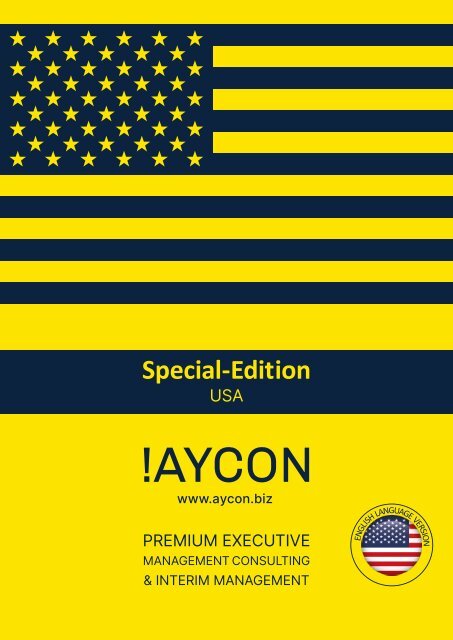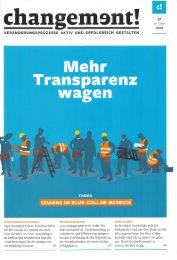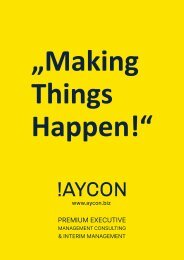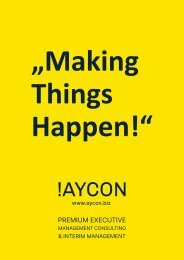AYCON SPECIAL - USA
AYCON SPECIAL - USA A German Interim Manager in the USA
AYCON SPECIAL - USA
A German Interim Manager in the USA
You also want an ePaper? Increase the reach of your titles
YUMPU automatically turns print PDFs into web optimized ePapers that Google loves.
Special-Edition<br />
<strong>USA</strong><br />
www.aycon.biz<br />
PREMIUM EXECUTIVE<br />
MANAGEMENT CONSULTING<br />
& INTERIM MANAGEMENT<br />
ENGLISH LANGUAGE VERSION
Photo: © Simon Doser<br />
!<strong>AYCON</strong> Edition<br />
A publication by:<br />
!<strong>AYCON</strong> | Ulvi I. AYDIN | www.aycon.biz
A German Interim Manager<br />
in the <strong>USA</strong><br />
Over the last few years, I've had many opportunities to<br />
work in the US - in several mandates and with different<br />
missions. It brings back memories of my time as<br />
an exchange student at Coopersville High School<br />
in Michigan - "Class of '78." Unlike in my yearbook<br />
photo, my hair is a bit greyer now, but I also have a<br />
few more years of management experience "under my<br />
belt." What's more - time and again, I have the privilege<br />
of working as an interim manager, consultant, and advisory<br />
board member for European companies in the US.<br />
Those are exciting mandates in an environment I know very<br />
well. However, a lot is new. Much of 1978 has vanished into thin<br />
air, and some has survived.<br />
In this Special Edition <strong>USA</strong>, I want to share my impressions, experiences,<br />
culture shocks, and inspirations of the land of opportunity with you. I observed<br />
the working world with the keen eye of an experienced German interim manager.<br />
I want to import the positive aspects I discovered in the US to Europe. At<br />
the same time, I export my business experience from Europe to the US - blunt<br />
and straightforward, as always. I've been back with mandates in the US for<br />
several months now. This is my sixth mandate abroad (Switzerland, Austria,<br />
UK, <strong>USA</strong>) and my fourth in the US.<br />
I get asked about the differences between Germany and the US often. What<br />
is different? Are there any key distinctions? Or even similarities? What stands<br />
out? Especially in this current US mandate, I get that question more often than<br />
before. I want to share my impressions in no particular order. I will examine the<br />
different perspectives and highlight what stands out to me personally.<br />
I hope you enjoy this insightful read!<br />
Or, to say it differently: Sharing some insights.<br />
Enjoy!<br />
Ulvi AYDIN<br />
!<strong>AYCON</strong><br />
SINCE 2005<br />
Ulvi I. AYDIN<br />
www.aycon.biz
Time Zones<br />
Today: Working in Different<br />
Time Zones<br />
Working in the US means a 6-hour time difference.<br />
In other words, Germany is 6 hours<br />
ahead of the US. Even worse, I'm currently in<br />
California, which means a 9-hour time difference.<br />
Of course, the US is 6 or 9 hours behind<br />
when I'm in Germany. I'm usually in the US for<br />
six weeks - then in Germany for a week or<br />
ten days, and then off again to the US for six<br />
weeks. Working in two countries, on two continents,<br />
in two time zones with a 6- to 9-hour<br />
time difference means operating in two worlds<br />
with vastly different cultural characteristics.<br />
From a purely organizational point of view, it<br />
is always exciting. Other (also important) things<br />
still happen in Germany while I'm in the US, and<br />
I have to be part of calls or Teams and ZOOM<br />
meetings in Germany, Switzerland, or Austria.<br />
It often means setting the alarm for 3 or 5<br />
am to attend meetings at the appropriate European<br />
time. Or, when I'm in Germany, attending<br />
US meetings at 8 or 9 pm European time. They<br />
can then go on until 11 pm – and they often do.<br />
The point: Don't let it bother you. That's part<br />
of the mandate. Good sleep management is<br />
crucial (going to bed on time). Get up half an<br />
hour beforehand, shave, and shower (you can't<br />
show up in front of the camera in your pajamas<br />
if you overslept) - even better, get up 45 minutes<br />
before the call if you still have to prepare<br />
for it or, get up an hour before the call if you are<br />
the one presenting.<br />
Then the night often ends at 2 am. I usually<br />
don't go back to bed afterward but hit the gym<br />
until the breakfast buffet opens. So, on days<br />
like this, this means going to bed at 8 pm US<br />
time (I need my six hours of sleep). How often<br />
does this happen? About 2-3 times a week!<br />
What's the takeaway? Anything is possible!<br />
It requires organization – and discipline! Once<br />
you get used to this rhythm, it's actually pretty<br />
easy. However, it impacts one critical aspect of<br />
your private life. You often miss birthday parties<br />
or other celebrations. My three children<br />
are grown and out of the house. In any case,<br />
such an international mandate requires a partner<br />
who follows and supports this rhythm.<br />
The two essential requirements for a successful<br />
overseas mandate are:<br />
Discipline! Support!<br />
Photo: © South_agency / istockphoto.com
Photo: © monkeybusiness / depositphotos.com<br />
Mobility<br />
Today: Mobility - Relocating<br />
for a New Job<br />
It has always been like this in the US and will<br />
continue to be like this: high employee mobility<br />
for a new job. Relocating within the US is often<br />
no problem at all, even with "bag and baggage"<br />
or, to put it differently, with "kit and caboodle."<br />
The high willingness to move is culturally<br />
and traditionally anchored. Americans fearlessly<br />
move across the country and adapt to<br />
new surroundings, landscapes, and neighbors.<br />
It is often considered an enrichment that<br />
one has already lived in Nevada, Ohio, Florida,<br />
and Washington State - a personal and professional<br />
gain.<br />
Living and working in different corners of<br />
the country means broadening your horizon,<br />
and this applies to blue-collar and whitecollar<br />
employees alike and, of course, to the<br />
management level.<br />
Many still have this "pioneering spirit" - the<br />
willing ness to broaden their horizons. There's<br />
no job for me in this state? Bummer - but okay!<br />
Then I go where there is a job - any job - maybe<br />
even one that pays more. In Germany - it's not<br />
like that.<br />
Photo: © everett225 / depositphotos.com
Onboarding<br />
Today: Status - Training New<br />
Employees & Onboarding<br />
In Germany, it is crucial to train new employees<br />
thoroughly. There are many checklists, induction<br />
routines, and training plans from the company<br />
side. Deservedly so, onboarding is a vital<br />
process so that new employees feel welcome<br />
and actually are, get a thorough orientation,<br />
and virtually have a perfect start.<br />
In the US, such an onboarding process is<br />
also very common, however, to a much lesser<br />
extent. New employees (starting from<br />
"middle management") often offer to create a<br />
90-day plan themselves and get prompted to<br />
do so. What am I going to do, what do I want to<br />
achieve, what contribution am I going to make,<br />
which specialists in the company do I want to<br />
meet, and which questions do I want to be answered<br />
as a new employee?<br />
This approach is super exciting. It nicely<br />
shows the new employees' management abilities<br />
and the “I am self-driven" aspect. Taking<br />
“<br />
Asking candidates<br />
to tell the company<br />
WHAT they<br />
EXPECT, WHEN,<br />
and HOW<br />
“<br />
responsibility for what I want to achieve as a<br />
new employee and what I EXPECT from my<br />
new employer and manager.<br />
I brought this aspect with me to Germany:<br />
asking candidates to tell the company WHAT<br />
they EXPECT, WHEN, and HOW! By the way, all<br />
this is in writing, which is not self-evident.<br />
It works very well!<br />
Do you want to know more? Let's talk!<br />
Photo: © Chattrawutt / istockphoto.com
Graphic: © Vladimir Ivankin / istockphoto.com<br />
Answers<br />
Today in this post, an issue that<br />
shows that many things are much<br />
more similar than you think: the<br />
length of answers!<br />
The quote from Martin Luther, "Show up confidently,<br />
speak your mind, and finish quickly," is<br />
just as important in the US as it is in Europe. It<br />
is of tremendous importance and gets just as<br />
often disregarded here!<br />
As in Europe, long, convoluted sentences<br />
are packed with ambiguities - probably in the<br />
hope that there will be something in there for<br />
the listener. Not for nothing, the English language<br />
came up with the communication slogan<br />
"If you cannot convince - confuse!"<br />
Here and now, the German interim manager<br />
comes into play with a complete violation of<br />
the rule. Entirely politically incorrect, I interrupt<br />
in such situations and say that I can no longer<br />
remember the beginning of this long sentence.<br />
For many Americans, this cultural clash of<br />
being so straightforward and direct is hard to<br />
swallow and very unfamiliar.<br />
Here are two valuable tips. First: I didn't<br />
come into a US culture from another culture to<br />
“<br />
Get to the Point.<br />
Provide Clarity. Kill<br />
Ambiguities<br />
howl with the wolves or to accept every thing<br />
by listening submissively, even if it doesn't<br />
make sense. Getting to the point and making<br />
clear and concise statements is actually a US<br />
style. That's how I always experienced it.<br />
Second: It is also clear that the board wanted<br />
this - even required it. My client – the CEO<br />
– also likes to quote Steve Jobs here, who said:<br />
"We don't hire smart people and tell them what<br />
to do. We hire smart people so that they tell us<br />
what and how to do it!"<br />
So get to the point.<br />
Provide clarity.<br />
Kill ambiguity!<br />
“<br />
With all due respect for the people, also be<br />
clear. If necessary, exaggerate. That is a language<br />
that defines successful companies all<br />
over the world. You won't be successful if you<br />
don't want, can't, or allow it!
Differences<br />
Today: Differences in everyday live<br />
What shapes everyday life, the daily routine,<br />
as far as I (not always) consciously observe<br />
it? Here in Ohio near Cincinnati, it is a lot<br />
more apolitical than we perceive on the news<br />
in Germany. No one walks around in cowboy<br />
boots or a Stetson here. Almost zero weapons<br />
to see. So a bit small-town, prim, quiet, and<br />
some times very tranquil.<br />
Let's discuss the difference<br />
in daily life in the <strong>USA</strong> vs.<br />
Germany.<br />
Streets:<br />
(<strong>USA</strong>) wide – not quite so wide (DE)<br />
Parking:<br />
(<strong>USA</strong>) nice and big – by now, too small (DE)<br />
Tipping:<br />
(<strong>USA</strong>) exorbitantly high – still quite normal<br />
(at least in my perception) (DE)<br />
Paying with a Credit Card:<br />
(<strong>USA</strong>) practically 99% –<br />
feels like 50% plus debit card (DE)<br />
Store Hours:<br />
(<strong>USA</strong>) every day (also Sundays) –<br />
Monday - Saturday (DE)<br />
Online Shopping:<br />
(<strong>USA</strong>) everything and always – on the rise (DE)<br />
Brick-and-Mortar Specialty Stores:<br />
(<strong>USA</strong>) the trend goes towards a meager 5% -<br />
10% – still approx. 50% (DE)<br />
Photo: © Drazen Zigic / istockphoto.com<br />
Department stores:<br />
(<strong>USA</strong>) trending towards less and less –<br />
actually already zero (DE)<br />
Flight Shame:<br />
(US) what's that? – Hmmmm… (DE)<br />
Trash / Plastic:<br />
(<strong>USA</strong>) I cause as much plastic waste here as a<br />
family of four in Germany – getting less (DE)<br />
Fear of the Future / Worries:<br />
(<strong>USA</strong>) It'll work out – more of a proactive<br />
attitude - the word "German Angst" has now<br />
been adopted into the English language (like<br />
"Rucksack," "Hinterland," and "Blitzkrieg")<br />
– in Germany, people's perspective seems<br />
skeptical (most of the time) (DE)<br />
Mobility (within the country):<br />
(<strong>USA</strong>) extremely high – relatively low (DE)<br />
Mobility without a car (here):<br />
(<strong>USA</strong>) not possible – it works (DE)
Photo: © peterwey / depositphotos.com<br />
Fast Food / Convenience Food:<br />
(<strong>USA</strong>) 99% – it won't take long to 90% (DE)<br />
Christmas – more of a religious celebration<br />
or more of business and folklore:<br />
(<strong>USA</strong>) 85% business and folklore –<br />
(DE) 90% business and folklore<br />
HALLOWEEN – more business and folklore:<br />
(<strong>USA</strong>) 85% business and folklore –<br />
90% business and folklore (DE)<br />
“<br />
I'd agree with you,<br />
but then we'd<br />
“<br />
both be wrong!<br />
Russell Lynes<br />
Family Aspect THANKSGIVING:<br />
(<strong>USA</strong>) 100% family aspect –<br />
10% harvest festival in the countryside (DE)<br />
Is this list complete?<br />
Of course not!<br />
Is this list subjective?<br />
Yes, of course!
Notice Periods<br />
Today: Termination - Notice Periods<br />
De facto, there is no notice period in the US!<br />
Yes, it's true: "Being fired from one day to the<br />
next!" is a thing. It's what is described as "hire<br />
& fire" in Germany. Usually - and this is the rule<br />
- there is a notice period of 14 days (calendar<br />
days!). It's called "two weeks notice."<br />
Many (in Germany) consider this terrible, unbelievable,<br />
and predatory capitalism.<br />
But! It also allows the employee to leave quickly.<br />
The freedom to start your new (desired)<br />
job faster and more swiftly. With more salary?<br />
With more freedom? With more development<br />
opportunities? So: Is that an advantage for the<br />
employee? In my opinion, a resounding yes.<br />
Here's a quick personal experience. I became<br />
a Department Head at the age of 31. With<br />
a decent company car. Salary: perfect. Bonus:<br />
The bomb! The notice period in my contract?<br />
Attention! 12 months to the end of the calendar<br />
year. I was on cloud nine! I thought I had hit the<br />
jackpot. That was supposedly the spearhead<br />
of my development.<br />
After almost two years, I wanted to leave.<br />
Too much politics. Too many small-minded<br />
people. Suddenly, the notice period hung<br />
around my neck like a heavy iron chain. After a<br />
few discussions with the Executive Board and<br />
the Supervisory Board, they let me go relatively<br />
quickly. That's where the quote "Never hold up<br />
travelers." comes from.<br />
Bottom line from the perspective of seniority<br />
and the US and Germany? You can't stop<br />
free spirits! Never! And people who don't dare<br />
stay where they can't leave. It has nothing to<br />
do with wanting. There are (laboratory) experiments<br />
on behavior that you can transfer to organizational<br />
development.<br />
If you lock someone up - lock them up for<br />
a long time, bind them to you for a long time -<br />
and then open the lock and door, then...<br />
Photo: © Jovanmandic / istockphoto.com
Graphic: © Mironov Konstantin / istockphoto.com<br />
KISS<br />
Today: “KISS”<br />
There are also commonalities – similarities:<br />
Missing "KISS." My favorite acronym is "KISS."<br />
For me, "KISS" always stands for: Keep it short<br />
and simple! Keep it simple, stupid! Keep it<br />
short and sexy!<br />
Excellent managers can present complex<br />
issues and strategies with "KISS." Within<br />
2 minutes, they can represent the essence<br />
(essence is defined as the "nature of a thing").<br />
Albert Einstein once said: "If you can't explain it<br />
to a six-year-old, then you don't understand it<br />
yourself!" Or as Dwight D. Eisenhower said: "If<br />
you can't summarize it on one page, it is neither<br />
thought through nor ready for a decision!"<br />
Not-so-good managers (to put it euphemistically)<br />
can't do that. And these are then an<br />
imposition and usually also losers. In my interim<br />
manager, consultant, and advisory board<br />
member mandates, I tell my clients and C-suite<br />
managers that if they can't present the substance<br />
of an essential strategy in two minutes,<br />
they won't be able to do it in two hours, either.<br />
Because a fundamental fact - such a strategy –<br />
wants and needs to be understood and accepted<br />
by everyone in the workforce, customers,<br />
and banks. By all stakeholders! Outstanding<br />
managers can do that! This ever dwindling<br />
quality seems to be an international, even universal,<br />
virus.<br />
The reaction is even more refreshing when<br />
I point out in my not-so-reserved manner that<br />
I didn't understand them. That what they presented<br />
was too complicated, too complex.<br />
It ALWAYS leads to exciting and constructive<br />
discussions. The 180-page presentation<br />
gets streamlined. The two hours and around<br />
12,000 words ("for a German speaker, a value<br />
between 90 and 120 words per minute is within<br />
the reference range") get condensed into ten<br />
pages and around 2,000 words. And – voila!<br />
Comprehensibility increases. And – also understanding.<br />
And with it, acceptance! It is identical<br />
in Germany and the US.<br />
So get to the point!
Photo: © YakobchukOlena / istockphoto.com<br />
VALET PARKING - Shoe Shining<br />
Today: Service! Service! Service!<br />
It is an extremely enjoyable experience. Very<br />
pleasant to take advantage of. It's perfectly<br />
natural and goes without saying.<br />
Shoe Shining Service at trade shows, airports,<br />
and shopping malls. It's a no-brainer. Sit<br />
down and chat, and your shoes are immaculate.<br />
Delivery Service – it's as natural as shopping<br />
or picking something up yourself. You<br />
don't even think about it. It's what you do.<br />
Valet Parking at good restaurants. You drive<br />
up - they park your car and get it for you after<br />
dinner. What you take for granted here still<br />
seems "exploitative" in Germany. Here in the<br />
US, it's a natural part of life.<br />
Does this service create jobs? Probably yes.<br />
Highly skilled jobs? Probably not! But does it<br />
create jobs at all? Absolutely yes!<br />
And one thing to remember: This is not a<br />
charitable service. Every single action costs<br />
you money – often quite a lot.<br />
Service Desert <strong>USA</strong>: absolutely not! Service<br />
Paradise <strong>USA</strong>: it seems like it!<br />
Germany: more of a service desert than a service<br />
paradise. REWE or Gorilla delivery service<br />
(as long as they are still around) in Germany?<br />
As is often the case, the US leads the way. And<br />
Germany screws up implementing the idea.<br />
The words service and "to serve" have more<br />
of a positive connotation here in the US, but<br />
not so much in Germany. In Germany, "serving"<br />
seems less positive and sometimes even negative.<br />
So, as is so often the case, it's about more<br />
than just the money or the organization. It's<br />
more about accepting the service - and the offer.<br />
The attitude to the service.
Photo: © Ivanko_Brnjakovic / istockphoto.com<br />
Job Title vs. Company Car<br />
Today: Status – Job Title vs.<br />
Company Car<br />
In Germany, the company car has long been a<br />
status symbol. Which brand? What features?<br />
What extras? Displacement? Cylinder? HP?<br />
THAT was important. I must admit: I felt special<br />
when I received my first company car. It was<br />
the same with the second. Then I could choose<br />
freely what I wanted, and I felt like a million<br />
bucks.<br />
It's all completely different today! With age<br />
and seniority, this becomes less and less important.<br />
It's utterly irrelevant today. In my opinion,<br />
the younger generation today doesn't<br />
seem to care at all about this. But the car is still<br />
important for some reason - it's still a "status<br />
symbol.” At least a little.<br />
In the US, it still seems (it used to be)<br />
unimportant. Managers very often receive<br />
a monthly car allowance in the amount of<br />
$500.00-1,000.00. That's it! Here! Take the<br />
"car allowance." Everything else is up to you.<br />
It's different with titles! In the US! My perception:<br />
In Germany, that was always secondary.<br />
Not so important. No issue.<br />
Of course, "Managing Director" or "Authorized<br />
Signatory" are legally employed and defined<br />
titles. But everything else is and was<br />
some what secondary. In the US, the title is –<br />
still – what used to be important to a manager<br />
in Germany: Appreciation! Status! Pride!<br />
Not just a "Manager." It should be a Vice<br />
President. But nothing less than a "Director."<br />
Or the other way around. Somehow everyone<br />
is a manager. Therefore, "VP" or "Director" is<br />
not just a title. It does something to you. It "elevates"<br />
you, just like previously the company<br />
car in front of the door in Germany.<br />
PS: If a senior manager needs more than<br />
20 minutes to choose his company car and its<br />
features, he isn't one!
Sustainability<br />
Today: Sustainability<br />
In Germany, the development of sustainability<br />
and waste prevention is everywhere. There is<br />
no plastic cutlery, no plastic straws, no plastic<br />
bags when shopping for fruit and vegetables,<br />
and no plastic bags (anymore) to carry home<br />
your groceries. Shopping baskets, cloth bags,<br />
reusable string bags, reusable cups, etc., are<br />
popular – and I practice this "to the nth degree."<br />
In the US, "sustainability" is somehow<br />
" there." But much less so, less practiced. In<br />
California, it might be different. It probably is.<br />
But I've never used/needed to use so much<br />
"disposable stuff" in my daily life as in Ohio.<br />
I haven't produced that much waste in years,<br />
either.<br />
My "carbon footprint" is not that great with all<br />
my flights. But in this large and vast country,<br />
the train is not an alternative in the US. Neither<br />
is the car. If I want to get from Cincinnati<br />
to San Francisco, I have to fly. That's almost<br />
2,500 miles (4,000 km) - one way. When I<br />
go for 2,500 miles from Munich, I am in –<br />
e.g., Baghdad. Imagine that: Cincinnati-San<br />
Francisco is practically the same physical distance<br />
as Munich-Baghdad!<br />
With these distances within the US, I simply<br />
cannot travel sustainably. So I have to fly. And<br />
waste prevention in the US is also a challenge.<br />
Refueling<br />
Today: Refueling<br />
On October 4, 2022, in Remington, IN, 12 gallons<br />
- i.e., about 45 liters cost $50.18 - i.e.,<br />
50.19 euros. One liter for about 1.11 euros! I<br />
almost felt like I was back in the good old days<br />
(well, more like approximately two years ago in<br />
Germany.)<br />
Oh, man!<br />
A full tank for 50.00 euros!<br />
That is most likely still different in the US and<br />
Germany. And the Americans are moaning and<br />
groaning about their horrific gas prices! I'd be<br />
thrilled if those gas prices came to Europe.<br />
Photo: © JulyProkopiv / istockphoto.com<br />
Photo: © privat
Carbon Footprint<br />
Today: Carbon Footprint<br />
I have just been in Germany for a week. The<br />
news in Germany - among other things: "Last<br />
generation - roadblocks because of taped<br />
hands, feet, etc." Sustainability is critical.<br />
Hearing such news makes you realize there<br />
is always a change between the planetary systems,<br />
especially if you fly back and forth between<br />
Europe and the US. Today, I'm flying back<br />
again to the US for six weeks, which is hardly<br />
an issue. Sustainability? Known! Virulent? No!<br />
Carbon footprint? Known! Virulent? No!<br />
I'm afraid I screwed up my carbon footprint in<br />
the US. And now, I will do it again. 4 flights per<br />
week! I (have to) jump in the car for everything!<br />
After my mandate in the US at the end of the<br />
year, I will have to recalibrate myself (again).<br />
The definition of "calibration" fits perfectly:<br />
"What does calibration mean? During calibration,<br />
we refer to a precisely defined input<br />
variable as normal and compare it with the<br />
measure ment result of the measuring system."<br />
Let's look at the German word for measuring<br />
system: “Messsystem." The word "Messsystem"<br />
is indeed written with 3 's' in a row. I<br />
rechecked it to be sure.<br />
I recently wrote a blog post on LinkedIn about<br />
"Sustainability." This article is part II of that.<br />
Photo: © enot-poloskun / istockphoto.com
Tipping<br />
Today: Eating Out.<br />
Buying/Picking Up Food<br />
In the US, you are expected to "tip," i.e., leave a<br />
gratuity. About 12-15-20% is expected. Leaving<br />
only 10% is always followed by the question of<br />
what was wrong.<br />
Now 15% has almost become the minimum.<br />
The bills show how much tip you can/should<br />
give. It suggests 15%-18%-20%. In metropolises<br />
like NYC, they even point this out very<br />
offensively. "Don't forget to tip!" And – I'm in<br />
Manhattan right now – tips start at 18%. You<br />
can choose between 18%, 22%, and 25%.<br />
Now – and this is relatively new to me – it<br />
has also become a (bad) habit when picking up<br />
food (salads, sandwiches, pizza) in one of these<br />
"takeaway" places. You stand in line, order,<br />
and get your food. Of course, you will be asked<br />
at the payment terminal to "select" 10-15-18-<br />
20% gratuity when paying. I've been traveling<br />
the US for 35 years. But I noticed this for the<br />
first time during this mandate. Obviously! If you<br />
have been in the office for several months, you<br />
don't go to a restaurant every night. I'll grab a<br />
sandwich or a bowl on my way home from the<br />
office.<br />
Actually, I'm still in the culture pitfall. My first<br />
reaction (only with "takeaway," not in a restaurant<br />
and not with delivery service) is "No."<br />
Why should I give a tip for standing in line at<br />
the counter, choosing, ordering, paying, picking<br />
up, and leaving? But then I always give<br />
a gratuity because I hope it will help increase<br />
the employees' pay. By the way, my American<br />
team members are also stunned by this development.<br />
This tipping development is welcome to stay<br />
in the US! I'm (almost always) happy for the<br />
staff. But – it doesn't need to come to Europe.<br />
Please stay in the US!<br />
Photo: © spirit2 / depositphotos.com<br />
Photo: © Valentyn_Volkov / depositphotos.com
Greetings<br />
Today: Greetings in Everyday Life<br />
What feels good, pleasant, and joyful? Hey -<br />
how are you doing? Welcome! How are you doing<br />
today? Howdy! Great to see you. Thank you<br />
for shopping with us. Hope to see you again<br />
soon. Have a great day. Take care!<br />
Many who are critical of the States have criticized<br />
these greetings as superficial. They are<br />
(allegedly) "not real." Me? I love it when someone<br />
greets me nicely, politely, and attentively.<br />
And also says a friendly goodbye. I like that<br />
very much. It's doing something to me. It is<br />
uplifting and has a positive effect.<br />
I like that very much in the US. And when I experienced<br />
it again in this mandate, I realized I<br />
missed it. And I will miss it again in Germany.<br />
Unfortunately, in Germany, I encounter many<br />
people - from all walks of life and generations<br />
- often as greeting grouches. People come into<br />
a bakery, stand in line, and can't open their<br />
mouths.<br />
No "Good morning" or "Howdy"! The willingness<br />
when someone enters a shop to greet, to<br />
say "Hello," to exchange two or three pleasantries<br />
seems to be becoming less and less common<br />
in Germany.<br />
So it's even more refreshing in the US to hear<br />
a "Howdy" or "Hey - how are you doing?" from<br />
and with people in hotels, in small towns on<br />
the street, at the bakery, or the supermarket<br />
checkout.<br />
In this spirit:<br />
Take care!<br />
Have a good day!<br />
Be well!<br />
Stay well!<br />
Photo: © pixelheadphoto / depositphotos.com
Interesting Facts & Figures<br />
Survey:<br />
Worries about the Climate<br />
Climate change is a serious problem - say:<br />
<strong>USA</strong><br />
Germany<br />
0 25 50 75<br />
Source: Konrad-Adenauer-Stiftung e.V.<br />
Renting vs. Owning<br />
Percentage of households who rent their home<br />
<strong>USA</strong><br />
Germany<br />
36 % 54 %<br />
Source: Konrad-Adenauer-Stiftung e.V.
Transatlantic Survey:<br />
Influence in Europe<br />
Which country is most influential in Europe?<br />
Answers in the <strong>USA</strong><br />
Answers in Germany<br />
23 %<br />
Germany<br />
UK<br />
France 5 %<br />
11 %<br />
UK<br />
48 %<br />
20 %<br />
other<br />
answers<br />
other<br />
answers<br />
13 %<br />
71 %<br />
Germany<br />
9 %<br />
France<br />
Americans and Germans rate Germany's role in Europe very differently — results from the “Transatlantic<br />
Trends” study by the German Marshall Fund and Bertelsmann Foundation.<br />
Source: Konrad-Adenauer-Stiftung e.V. / Transatlantic Trends - GMF and Bertelsmann Foundation<br />
<strong>USA</strong> AND GERMANY<br />
Economic Relationship<br />
685.886<br />
882.174 $ 373 B<br />
$ 148 B<br />
<strong>USA</strong> in DE Jobs<br />
DE in <strong>USA</strong> Jobs<br />
<strong>USA</strong> in DE Investments<br />
DE in <strong>USA</strong> Investments<br />
Source: Wilson Center Transatlantic Economy 2021 (2019 figures)
www.aycon.biz














